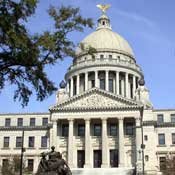Money is on the mind of every legislator entering the state Capitol tomorrow for the start of this year's Mississippi legislative session. Officials predict a shortfall of about $360 million in revenue by the end of fiscal year 2010 in June, and everybody holding an elected job will be nervous that the cuts they agree on this year could impact them in the 2011 elections.
"The shortage of money will be the driving force this time around, and I think we'll all be amazed at how well legislators will come together to try to battle this issue," said lobbyist Stan Flynt, who predicted that personalities uncommitted to thoroughly working with their peers in passing a stable budget will suffer serious competition in the 2011 election.
The Joint Legislative Budget Committee ducked tradition by working quickly to pass a non-specific budget last month that permanently deletes 3,656 vacant state positions, and temporarily defunds any remaining positions currently unfilled. The committee's fiscal year 2011 budget recommendations also include a 10 percent blanket reduction in all state agency budgets and nearly 6 percent in reductions for the Mississippi Adequate Education Program.
The Joint committee also called for $10.6 million in fee hikes for vehicle title fees, and annual filing fees for limited-liability companies paid to the secretary of state's office.
The governor, so far, stands against the fee increases.
"What I cannot agree to are tax increases (including job-destroying fee increases that are simply disguised tax increases)," Gov. Haley Barbour wrote in a Jan. 3 letter to The Clarion-Ledger. He also said was against any "low-balled spending estimates" or excessive use of the state's rainy day fundwhich he wants to last at least three years.
Barbour is also against legislators' recommendation of a tax amnesty program in fiscal year 2011. Legislators say Louisiana has already raised $450 million from its own amnesty program, and estimates Mississippi could make $35 million in fiscal year 2011. Barbour, however, opposed the tax amnesty, saying it would "create non-recurring revenue."
Legislators are also considering transferring an extra $35 million from the Health Care Trust Fund to the Health Care Expendable Fund, although the governor considers the proposition a "raid," and wants to avoid it.
The battle this year will likely be between legislators, facing the prospect of walking into a difficult 2011 election after agreeing to a series of highly unpopular cuts in state services, against a governor who cannot run for election a third time around and is apparently fine with draconian cuts.
Look for cracks in the Republican wall this year as some conservatives side with Democrats in budget battles with the executive office.



Comments
Use the comment form below to begin a discussion about this content.